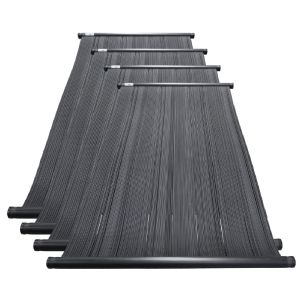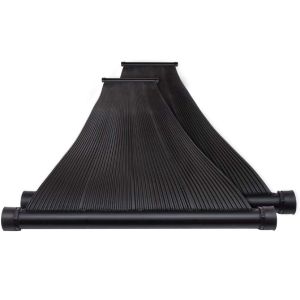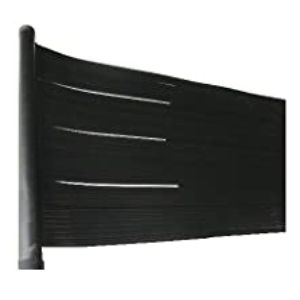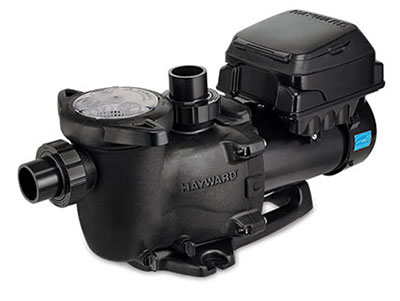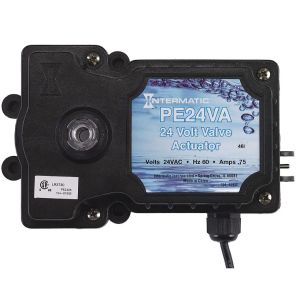- Salt Water Pool and Spa
- Inground Pool Heaters
- Solar Powered Pool Heaters
Solar Powered Pool Heaters
A solar powered pool heater will help produce warm and inviting water temperatures using free energy from the sun. It's a smart way to increase the enjoyment of your pool and can even add months to your pool season. It's a cheap alternative to heating your pool and can reduce your monthly heating costs if used to supplement an existing electric or gas heater. Whether you live in Arizona, Alberta, Australia or anywhere that receives at least 6 hours of sunlight a day you can take advantage of energy from the sun to heat your pool.
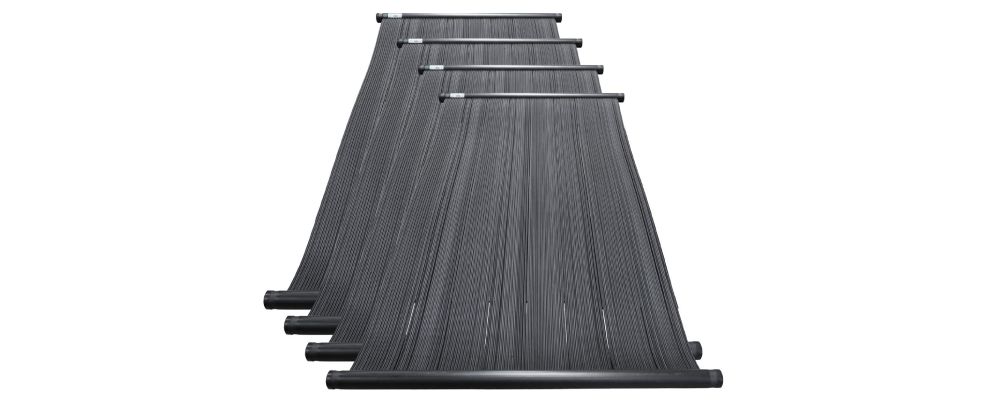
The energy will vary depending on your geographic location but there are ways to determine solar efficiency based on factors including sunlight hours and panel angle. We'll go over everything you need to know to make an educated decision about installing a solar system to heat your pool. We'll take a look at how a solar powered pool heater works, the number of panels required, panel size, pump requirements and solar efficiency so you can make an informed decision about purchasing the best solar powered pool heater.
How a Solar Pool Heater Works
Water is diverted from the main pool system and into the solar collector panels. This process occurs when the pool requires heating and can be done manually or automatically with the use of a controller, sensor and automated valve. The water sits in the panels for a period of time absorbing heat energy from the sun, and depending on the amount of solar energy received, the water heats to a temperature warmer than the existing pool water.
The water that has been heated by the sun is returned to the pool and replaced by fresh water from the pool. This cycle can be repeated as often as every 45 minutes resulting in a gradual increase in temperature over time until the desired set temperature is reached. You can expect the water temperature in your pool to increase 1℉ in as little as one cycle with sufficient sunlight energy.
Best Solar Powered Pool Heaters
The best solar powered pool heaters on the market today apply the latest technology in the solar industry to residential pool heating. They come with everything you need to get started for basic do-it-yourself installations including easy to follow instructions. You can count on years of free heat and a more comfortable swim in warm and inviting water temperatures.
DIY Solar Pool Heater System Kit
The best solar powered pool heater panels by SwimEasy are manufactured in the USA and can be purchased in a kit with four high quality panels. The high-grade materials and specialized production means the panels can withstand harsh weather conditions in all climates, but up to 20 years. The panels design allows for maximum heat absorption while minimizing the amount of heat lost and the zipper feature allows for custom installation on any shape roof.
SwimEasy DIY Solar Pool Heater System Kit 4'x8' PanelsIf you click on this link and make a purchase, we may earn a commission. |
Sunquest Complete Solar Pool Heater System
The SunQuest solar pool heater complete system can be used for both inground and above ground pools. It comes with a roof mounting kit for easy do-it-yourself installation that any handy pool owner can do with a bit of elbow grease. It features a state of the art design that allows increased circulation that will reduce work on your pump and increase temperature efficiency and save you a lot of money in pool heating costs.
SunQuest DIY Solar Pool Heater Panel KitIf you click on this link and make a purchase, we may earn a commission. |
SmartPool Solar Heating System for Inground Pools
The Smart Pool solar heating system for inground pools comes in two large panels that form a huge 80 square feet of polypropylene heat collector panels. It's the most affordable solar powered pool heater on the market and is backed by a 4 year limited warranty. The installation kit and automation controller are sold separately.
Smart Pool Inground Solar Heating System 2 x 20' PanelsIf you click on this link and make a purchase, we may earn a commission. |
If you are in the market for an above ground solar pool heater you will be pleased to know that most kits can be used for both inground and above ground interchangeably. They work exactly the same way and should come with the appropriate adapters, and if not they can be purchased separately. If you need additional installation parts search online, contact the dealer or visit your local hardware store.
Solar Powered Pool Heater System
The following are parts that make up a solar powered pool heater system that are designed to be simple and easy to use. They take time to install but in the long run they are definitely worth the initial investment of time and money. You can expect to recuperate the costs of the heating system in as little as one to two seasons with the money saved by not using gas or propane fossil fuels.
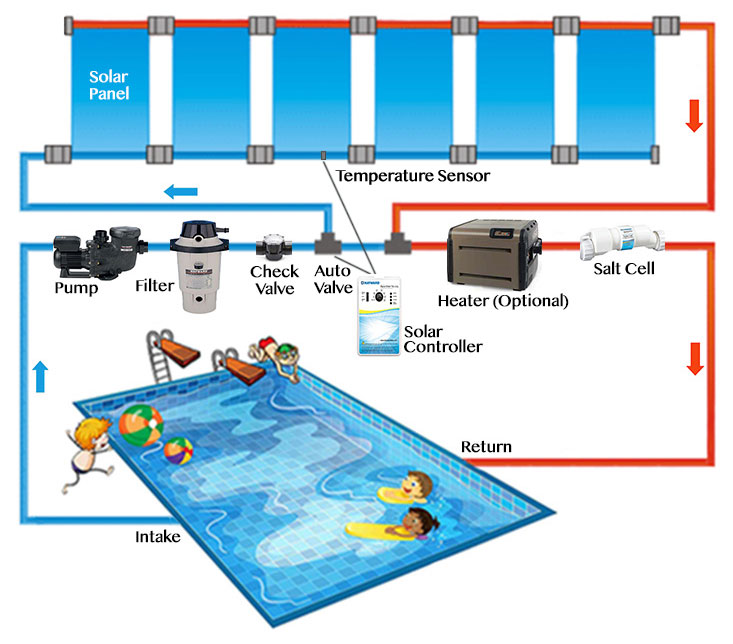
- Pool Pump
- Pool Filter
- Check Valve
- 3-Way Valve
- Solar Controller
- Solar Panels
- Pool Heater (Optional)
- Chlorine Generator (Optional)
1. Pool Pump
The pump is relied on to push water into the solar system plumbing and solar collector panels. This could be a big task especially if you have added several feet of plumbing, elbows and elevation changes that are common on rooftop installations. The question becomes whether or not you need to upgrade to a higher powered pump or a more cost-effective variable speed pool pump.
If you'd like more information about pool pump sizing you can find it by following the link. We recommend a high powered variable speed pump to ensure heating efficiency of your solar powered pool heater while reducing your electrical costs to operate the pump. A variable speed pump will allow for efficient pool system operation when you aren't diverting water to the panels and be able to step up water pressure during times of pool heating.
Hayward TriStar VS Pool PumpIf you click on this link and make a purchase, we may earn a commission. |
2. Pool Filter
The pool filter should be capable of handling a solar powered pool heater assuming it is already sized properly for your pool. There may be a slight increase in demand on the filter if your system is operating more frequently during times of heating or cooling. Keep this in mind as your filter may require backwashing and the filter paper may need cleaning more often during these increased pool system run times.
3. Pool Check Valve
A check valve is an important part of the solar powered pool heater system because it will prevent water from flowing in reverse in the pool plumbing. This can be a problem especially if the panels are installed at a high elevation. This essential part should not be confused with the 3-way valve that we will discuss next.
4. 3-Way Valve
The 3-way valve is an important part of the system because it diverts water flow into the panels and again back from the panels on the return side. This valve can be controlled manually using a three port diverter valve or it can be controlled by a valve actuator that is can ultimately be controlled via a solar pool control package as an all-in-one option. The setup can a bit tricky so be sure to follow the manufacturer's instructions for proper installation.
Intermatic Pool Valve ActuatorIf you click on this link and make a purchase, we may earn a commission. |
5. Solar Controller
A solar powered pool heater control system adds the convenience of automation and hassle free operation. A controller maximizes solar heat collection with precise temperature readings that are relayed from the sensors. The controller will automatically open and close the valves that allow water in and out of the solar collector panels by activating your pool pump system.
The increased efficiency and hands off operation make solar automation controllers a very attractive option. You can count on automatic temperature control of your pool water even if it needs to be cooled, by circulating cool water into your pool at night when the ambient temperature is cooler than the water.
6. Solar Panels
The solar collector panels should be constructed of high quality materials designed to withstand extreme temperatures. The black tubing design will allow them to be easily handled during installation and lends itself to more surface area to absorb the suns energy. Look for freeze protection for cold weather climates and UV light inhibitors for constant ultraviolet light conditions. The panels can be pieced together in a series and are limited only by the amount of space you have, and adding a panel or two for increased heating energy is an option as well.
The final consideration is to determine where you will be installing the solar panels. You will need to weigh the advantages of location and solar efficiency for your specific pool application. Your options include mounting the panels on your roof, a custom hanging rack, fence or ground area, and each one will require installation hardware.
7. Pool Heater
A pool heater may still be part of your solar heater system if you experience cooler spring and fall temperatures and want to extend the pool season beyond the capabilities of the solar panels. A natural gas or heat pump pool heater can be a great combination and supplementary heating unit for periods of low sunlight or when extra heating energy is needed throughout the pool season.
How Many Solar Panels Do I Need?
The following is a table that lists pools by water volume in Gallons and the amount of solar panels required in Square Feet. Note that the values provided are approximate and can vary depending on factors such as climate, desired pool water temperature, solar panel efficiency, and other unique conditions. It's always recommended to consult with a professional installer who can evaluate your pool's characteristics and provide a more accurate estimate if you aren't sure of your specific requirements.
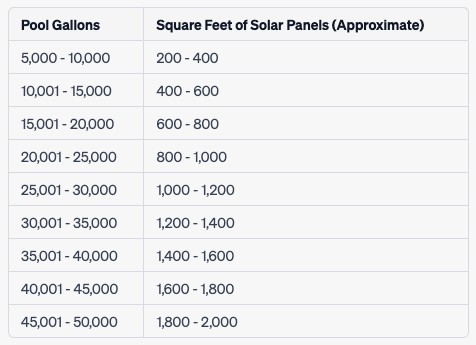
Solar Panel Efficiency
The efficiency of your solar powered pool heater can be affected by a number of factors that are as unique as your own pool. The money you spend on a new system will be worth every penny if you maximize the efficiency of the panels. Let's take a look at how location, tilt, environment and sunlight hours can affect solar heating efficiency.
- Panel Location
- Panel Tilt
- Environment
- Sunlight Hours
1. Solar Panel Location
The best places to mount the panels is anywhere near your pool that gets plenty of sun. It might sound simple but it can be tricky to find a place to fit 400 square feet of panels that's level, receives a lot of sunlight and isn't obstructed by shadows throughout the day. The most common places to mount the solar collector panels is on the roof of a house but if that isn't an option you might consider a custom built rack, fence or on the ground.
2. Solar Panel Tilt
The optimal tilt of the solar panels is based on the latitude of your geographic region. You simply tilt the panels at an angel equal to the latitude, or as close as possible. The closer you get to the right tilt, the higher the efficiency of the solar panels. In addition to the tilt towards the equator you should optimize the panels for maximum sun throughout the day. If you can't have the panels oriented directly south (USA and Canada) or north (Australia) try to get as close as possible.
If you find that you have no choice but to tilt or orient the panels with lower efficiency, you can make up for this by adding more panels that will increase the square footage.
|
Canada |
50°- 60° Tilt |
South Orientation |
3. Environment
The environment and weather around your pool plays a role in overall heater efficiency. If you've lived in your home for a number of years you probably have an idea of trends in weather like fog, rain and cloud cover. You also want to make sure that you aren't installing the panels in an area that's shadowed by a tree, tall building or similar.
4. Sunlight Hours
The ultimate goal is to expose the panels to direct sunlight for as long as possible. This will result in the highest efficiency, water heating up faster, extending your pool season and reducing the amount of panels you need. If you are supplementing your existing electric or gas pool heater, increased efficiency will result in lower heating costs.
Solar Powered Pool Heater Cost
The cost of a typical solar pool heater system for an inground pool can vary depending on several factors, including the size of the pool, desired temperature increase, location, and installation requirements. However, as a rough estimate, a solar pool heater system for an inground pool can range from $3,000 to $8,000 or more.
This cost typically includes the solar collectors or panels, mounting hardware, plumbing connections, a circulation pump, a controller, and installation labor. Additional costs may arise if you require any modifications to your existing pool system or if there are specific installation challenges at your location.
It's important to note that this estimate is a general range, and prices can vary significantly based on factors such as the complexity of the installation, quality of materials, regional differences, and any additional features or accessories you may choose.
Winterizing Solar Pool Heaters
Getting your solar powered pool heater ready for winter is essential to preventing cracks or other damage during sub zero temperatures. The goal is to remove all water from the plumbing and collector panels and can be carried out during your regular pool winterizing or closing. Allow water to drain from a low sitting drain, ball valve or check valve and if you suspect there is still water in the system, blow the water out with forced air. This can be done with a blower or compressor with attachment.
Solar Powered Pool Heater FAQs
How do solar pool heaters work?
How do solar pool heaters work?
Solar pool heaters use solar collectors or panels to capture energy from the sun, which is then transferred to the pool water as it circulates through the system, effectively heating the pool.
Are solar pool heaters effective in colder climates?
Are solar pool heaters effective in colder climates?
Solar pool heaters can still be effective in colder climates, but their efficiency may be reduced, and additional panels or a backup heating source may be needed to maintain desired temperatures.
How much can a solar pool heater increase the pool's temperature?
How much can a solar pool heater increase the pool's temperature?
A properly sized and installed solar pool heater can typically increase the pool's temperature by 5 to 15 degrees Fahrenheit, depending on factors like sunlight exposure and panel area.
What is the lifespan of a solar pool heater?
What is the lifespan of a solar pool heater?
On average, a well-maintained solar pool heater can last between 10 to 20 years, depending on the quality of materials and installation.
Are solar pool heaters cost-effective?
Are solar pool heaters cost-effective?
Solar pool heaters can provide long-term cost savings compared to traditional heating methods as they utilize free energy from the sun. However, the initial investment and ongoing maintenance costs should be considered when evaluating cost-effectiveness.
Disclaimer
Please use all appropriate and proper safety precautions when attempting projects on this website. All projects are attempted at the reader's own risk.
Salt Water Pool and Spa™ participates in the Amazon Services LLC Associates Program, as an Amazon Associate we may earn a commission from qualifying purchases.
